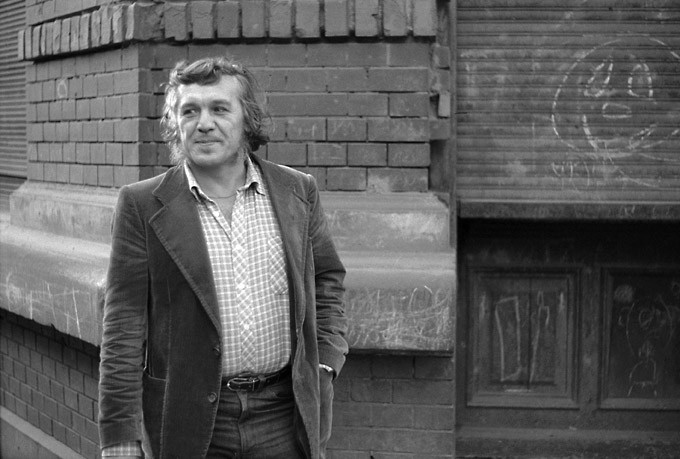Scan barcode
A review by glenncolerussell
The Females by Wolfgang Hilbig

Wolfgang Hilbig (1941-2007) had a tough life - he grew up in the mining town of Meuselwitz, Germany with his mother (he never knew his father who went missing in WWII) and started working in a boring mill as a teenager. Following military service, he worked as a tool maker and in assembly construction for the Meuselwitz lignite mine. It wasn't until he reached age thirty-seven that Hilbig moved to East Berlin where he finally seized the opportunity to live by his writing.
Reading Females, one can smell all those grimy Meuselwitz years as if their oily, sooty filth and stench coat every page, especially the opening scene where the narrator relates how he's trapped in a damp, hot hell, sweat and stink gushing from each pore, his eyeballs bulging and welling with a sort of slime as he arranges steel casting molds and cutting tools on shelves in a factory basement. Call-out to Isabel Fargo Cole for her clear, vivid translation.
Later in the novel, a government official addresses our unnamed narrator as Herr C., thus I'lI call him Carl. Anyway, Carl will occasionally stand on a chair in his basement and peer up through a grating at the backs of females working in a pressing shop, "they sat on tall three-legged stools that swayed and seemed to squeak; due to the heat they dispensed with cushions, the mass of each gigantic behind completely swallowing the stool's round wooden seat." As Carl relates, nearly all the workers in this factory are females.
Wave after wave of noxious, nauseating ooze in many potent forms continue to assail the senses of Carl the factory worker. "Nothing met my lips but dust washed from the floor, nothing clung to my hands but the fouled water's gasoline smell, all I had in my nostrils was the burned-rubber smell, the inhuman smell of plastic which, cooled for a few seconds by the water, now tasted even more vivid and more obscene."
It can't be stated too forcefully: Hilbig's short novel makes for one visceral experience; it's as if we're right there with Carl, almost inside his skin as Carl moves through his cruddy, squalid world, a cramped world smeared with grease and stinking of garbage. But as foul as his outside environment, Carl spits his deadliest venom at an even more loathsome target: himself.
Carl, a stand-in for Wolfgang Hilbig, recognizes he's a misfit, an outsider, a middle-aged man who still lives with his mother, a man stuck with a teenager's view of women, a man who smothered himself in pornography in his younger years and now feels powerless, even castrated, a man who must distort his everyday reality by constantly twisting it in obscene and freakish ways through images phallic and vaginal.
Added to this, Carl rages over the state's control of women and men's sexual identity and creative expression. For Carl, suffocation and dehumanization reach the tipping point - Carl lashes out at a man in the factory, a man he witnessed degrading a young lady. His violent outburst gets him fired. Once free to roam the streets day and night, Carl observes there's been a mass exodus of females from his town.
My take as to why Wolfgang Hilbig uses "females" and not "women" - it's the feminine aspect of life that has disappeared since East Germany has transformed itself into a debased form of masculine-only society, a society that's hard, static, unfeeling, unemotional, devoid of imagination and nurturing elements so critical to the life of a creative artist and writer.
At one point Carl tells us, "If I ever managed to feel that I possessed an identity, if I was able to develop any nebulous ideal of my I, it was only through experiencing myself, in writing as an active subject, albeit a subject I never dared disclose in public: I had made that mistake at the labor office, and my I had instantly been rebuffed in the harshest conceivable fashion."
Ah, art and literature can count for so much when one is held under thumb by a suffocating society. And Carl possesses a keen sensitivity to glimmers of life that contain a tincture of beauty. One of the more tender moments in the tale finds Carl on a bus, sitting behind a young lady where his hand is half an inch beside her soft hanging hair - oh, to be so close to the feminine but without the capacity or opportunity to touch it or bring its sweetness into one's life.
How much grime and scum and deprivation must an aspiring literary writer like Wolfgang Hilbig overcome in an oppressive culture (or anti-culture) like East Germany? One short sentence can express a wealth of feeling -
"I felt wretched again. In just five minutes I concluded I lacked the education to glimpse the females, even if they were still present, even if they existed by the millions."
Equally profound, a society can exert such power that individuals, both artists and non-artists, are deprived of the ability to even take the first step in knowing themselves. I'll conclude with an author quote most befitting:
"Whenever I'd felt within me the unforeseen power to examine myself, even to know myself, and consequently, perhaps, expunge the germs of my sickness, I found that the state snatched every tool from my hands, or hid all those tools from me, obscuring the means of ascertaining any kind of probability. The inevitable result was a serious disease, a pervasive disease of my ability to really and truly perceive the world, and a disease of my ability to truly make myself known to another person as a figure in reality. For me, reality had been stolen and annihilated, so by necessity I had to exist as a form of annihilated reality, as a mere delusion of reality, and by that same token had to annihilate the reality of the people around me."

German author Wolfgang Hilbig, age 46 in 1987, the year of publication for The Females